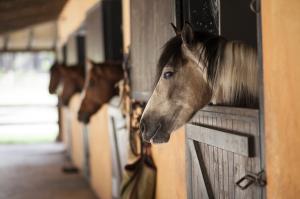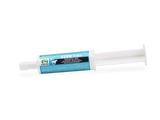As the colder months roll around, so does firework season, and whilst these occasions are viewed as a time of relax and recreation, horses might have a different perception. The effect of fireworks in horses has been documented (3): a large study in New Zealand found that the majority of horses (79%) manifested anxiety around fireworks. Fortunately, a few measures can help reduce anxiety in horses, according to their individual temperament and fear threshold.
Horse Anxiety: Calming Supplements
Several key elements can be added to the horse’s diet with an effect on their neurological and cognitive functions.
Group B vitamins are required for neurological function and modulation of nervous responses; some B vitamins are produced by the horse whilst others must be obtained through the diet. This means that horses with reduced appetite (due to anxiety, new environment and feed, or a combination), in high-stress situations (heavy training, competition, fireworks), amongst other instances, can have their B vitamin needs unmet.
Another crucial element is magnesium, required for a correct energy metabolism at a cellular level, including nerve cells; horses with magnesium deficiency show signs of inadequate nerve function such as muscle weakness, cardiac arrhythmias and dullness or depression (4).
Finally, the amino acid tryptophan is necessary in horses’ diet as the precursor to serotonin (the ‘happiness’ hormone), which modulates processes such as rest and digestion and stress response, acting as a mood stabiliser by reducing cortisol (the ‘fear’ hormone) in stressful situations (2).
Calming supplements with a combination of the above ingredients are specifically designed to reduce horses’ stress response without containing any pharmaceutical component.
Audevard Zzen® contains this triple combination (including critical vitamin B12) plus Ashwagandha tincture, which work synergistically to reduce anxiety without impacting performance. It can be fed daily for as long as required to help the horse’s focus and wellbeing, contributing to a balanced diet.
For punctual use, Zzen® Flash is concentrated in tryptophan and magnesium, perfect for on-the-go relief and to boost the effects of Zzen® when combined.
Horse Anxiety: Gastric Supplements
Whilst a degree of stress can be positive and help the horse adapt to the environment, at certain levels and over time it can hinder the horse’s wellbeing, health and athletic performance. Numerous studies have described the effects of anxiety on horses in different disciplines (1), and why helping them remain calm has so many benefits.
Gastrointestinal conditions are one of the main negative health outcomes from chronic stress in horses, with substantial evidence for the association between stress and glandular gastric ulceration (6).
So many aspects of the ‘modern life’ of a sport horse that increase the risk for gastric ulcers (6): high number of training days per week (>5), and long periods of training (>6 consecutive weeks), fasted exercise, stress from changing routines and grooms. Gastric ulcers are known to have a detrimental impact on performance (6). Whilst management strategies can be implemented to reduce the risk factors for gastrointestinal conditions, digestion supplements can be crucial to improve the horse’s comfort.
A blend of latest-generation ingredients: Pectigard Complex® (pectin-lecithin), magnesium hydroxide, sea buckthorn berries and probiotics, the Audevard Ekygard+® formula combines all the ingredients recommended by the European College of Equine Internal Medicine for the management of gastric discomfort in horses. (5) With this combination of scientifically validated ingredients, Ekygard+® provides a triple protection for the horse's stomach: it preserves the gastric mucosa, limits gastric acidity, and supports the gastric flora.
All of the above are useful tools to both help your horse cope with anxiety and prevent potentially harmful consequences. Your veterinarian is a first point of call for advice on your horse’s health and behaviour, as there are multiple options to suit each horse’s temperament and each owner’s needs, to ensure that everyone can make the most of the festive season.
References
1. Bartolomé E. and Cockram M.S. (2016) ‘Potential effects of stress on the performance of sport horses’. Journal of Equine Veterinary Science 40, pp. 84-93.
2. Davis B.P. et al. (2017) ‘Preliminary evaluation on the effectiveness of varying doses of supplemental tryptophan as a calmative in horses’. Applied Animal Behaviour Science 188, pp. 34-41.
3. Gronqvist G. et al. (2016) ‘The management of horses during fireworks in New Zealand’. Animals 6 (3), doi: 10.3390/ani6030020.
4. Stewart A.J. (2011) ‘Magnesium disorders in horses’. Veterinary Clinics of North America – Equine Practice 27 (1), pp. 149-163.
5. European College of Equine Internal Medicine Consensus statement (2015)
6. Sykes B.W. et al. (2018) ‘Management factors and clinical implications of glandular and squamous gastric disease in horses’. Journal of Veterinary Internal Medicine DOI: 10.1111/jvim.15350.
Written by: Dr Marga Mas DVM PGDip MRCVS (Guest Author)



